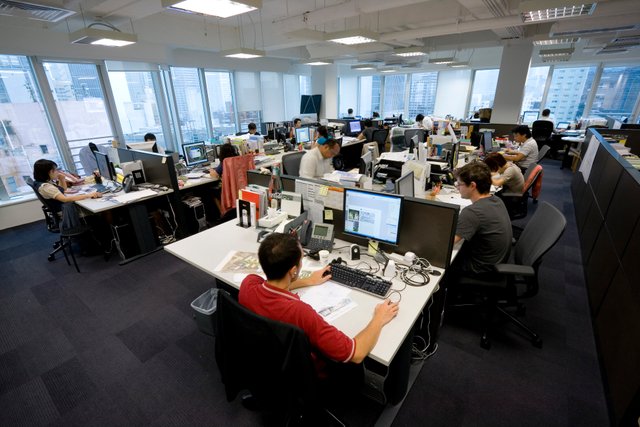P2P Value Transfers and the New Economy
P2P Value Transfers and the New Economy

Coming from what feel like highly uniform, geeky subcultures surrounding cryptocurrencies, I am overjoyed to see Steem's recent traction. I have not yet done a deep dive into Steem, so some of its technical underpinnings remain mysterious, but the take home message appears fairly straight forward: inflation is driven by users who create [theoretically] valuable content and the network is maintained by those most deeply invested in the platform. This is great for the crypto community because it abstracts terms like "consensus algorithm" and "block hash" away from the lexicon of a new user who wants to simply use the technology today. But it also ratifies the idea that we are heading to a new economy for which many of us are woefully unprepared.
To me, Steem represents a greater trend in cyberspace (as well as the broader economy). We are approaching a new paradigm where it is not hard work and perseverance that win out, but, instead, creativity and social clout. Whether this aligns with your skill set or not, it might behoove you to recognize this trend and think about how you would adapt should we all get caught in the rushing current running away from 9-to-5 desk jobs and into the direction of one-off contract work (the "Steem Stream", if you will).
We may all be swept away and that may happen sooner than we are prepared to admit.
Making a living in the "crypto space"

For several months, I have been putting serious effort into finding work in the "crypto space", as I call it. Coming from the real world, I am no stranger to job applications, interviews, Christmas bonuses, and all the rest. Given that I think blockchain technologies are going to revolutionize the world as we know it, and given the fact that I mostly understand how these things work and can build cool things with them, I consider myself an apt fit for a role in this space. But what I have found is that "roles" either A) don't exist in large numbers or B) aren't the same as "roles" in the real world. Technologies are open sourced on GitHub, startups create services and crowdfund them on the blockchain, and people work regular jobs while moonlighting development of public ledger products. Is there money to be made in this space? Absolutely. Are there opportunities to get hired, punch the clock, and live a normal life? Perhaps, but not many.
I feel obligated to disclaim that this is what we wanted, at least we in the crypto space. The goal of decentralization is to cut bloat and widdle down transactions between those who create value and those who consume it. The idea is that the platform itself should not be the richest entity in the ecosystem because it simply facilitates transfer of value. Instead, the creators of that value should be the primary beneficiaries of the ecosystem because they are the ones who actually define its utility.
This is a beautiful thing, but where does it leave the rest of us? Where does the vast majority of the workforce (who do a job as instructed every day and go home every night) flock to when the number one skill in demand is self-driven creativity? The days of reliably creating value for a company may soon be in the rearview mirror. We may all, by necessity, become content creators.
Value creation in the real world

Cryptoland is not the only place where I am seeing this paradigm shift. Remember the "Sharing Economy"? That marketing buzzword referring to a system that is neither shared nor an economy (but is intstead a series of transactions held and curated on central ledgers)? Leaving behind the opinion that this will be moved to p2p networks in 5-10 years, the "sharing economy" represents our paradigm shift on a far greater scale.
Leveraging unused assets and (usually) free time, individuals earn revenue by directly creating value for other individuals. Although some people have chosen to make a living in this "economy", these systems do not themselves ensure stable income. A driver will only see future earnings if he continues to physically drive and a host will only earn income if she continues to find new tenants. The only thing these sytems facilitate is access to the next customer. We have seen an explosion in these services, partially because many "old economy" jobs have already left (and are almost certainly never coming back) and partially because this is actually a lot cheaper. Individuals have no overhead. They do not need to pay fixed costs associated with a business when that business is simply a utilization of their time and personal assets.
This is the natural evolution of a free market and it is something that many of us want on a basic level. But, as in all things, there is a cost to this change. By leaving behind stable income streams, "sharing economy" workers introduce risk and interfaces between jobs. Every minute spent looking for the next fare or tenant is time wasted (and, for at least some people, time spent in anxiety). In a system where we are only as good as our next job, we are never at rest.
Is this a good thing?

Many arguments could be made about whether or not this shift benefits humanity, but the fact remains that it very well may be coming for us. You may have noticed that I have not yet mentioned the inexorable oncoming of automation to take away most of our boring jobs; this is because I believe this is a given (and CGP Grey agrees). I believe we absolutely must be planning for the new economy, but my point here is that this economy may be more dire than we originally thought. "Being creative" in a generic sense might not be enough because on many of these platforms, wealth and influence bubble up to the top (see: Pareto Principle). It may be statistically impossible for every one of us to find our niche because in reality, only so much value can be demanded (and consumed).
We as a society may need to look at options like basic income to ensure we don't disenfranchise large portions of our society. These are conversations we must have, and in fact these are conversations that are already happening in cryptoland.
But what can we do now? Can we beat the curve by establishing clout, buying crypto before it gets cool (i.e. being crypto-hipsters), or socking away enough cash to, in conjunction with the other things, retire early? This seems like a grim proposition.
I would posit that we can train ourselves to at least try to become creative and carve out a niche. We can start now (hell, I am starting with this blog post) and we can learn and iterate and experience as much as possible because maybe we weren't meant to be at rest in the first place. Maybe the 9-to-5 job that you hate is actually worse for your mental health than scraping by writing blog posts or making cool things on the blockchain. There are trade-offs in all things. My point is not to fire off cliches in rapid succession, but rather to tell you that this is something about which we all must be aware and that the future is very, very uncertain. Now is the time to contemplate and introspect and try new things and start building your place in tomorrow.
And who knows, maybe there is room for everyone. Maybe decentralization and peer to peer value creation will save the world. I suppose that only time will tell.
Dang definitely a great post!
I think Steemit has proved that even in a bitcoin world that something new can come a long and change the game ;D